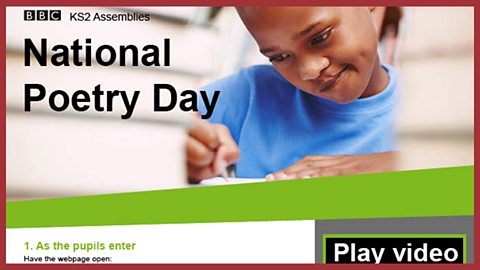In short...
Themes: National Poetry Day; creativity; taking inspiration from the natural world.
Summary: , founded in 1994 by the Forward Arts Foundation, aims to encourage people to read, discover and be inspired by poetry. The sharing, reciting and writing of poems goes back thousands of years. People always seem to have had a need to express themselves through poems. In 2024 National Poetry Day will be on 3 October.
Resources: the and an image of .

The video
Lyra and Volkan are pupils with different views on writing poetry. Lyra finds poetry comes easily to her, while Volkan finds it difficult to know what to write. With the help of poet , they set out to find inspiration from the world around them.
They go 'poem hunting' in London Zoo and as Kate says, poem ideas can 'buzz into our brains' when we're out and about. She encourages the children to think about the sounds of words, saying: 'We're making a piece of music.' Later, Lyra and Volkan share their animal poems with Kate.
Duration: 4' 20"
End of speech: '…so many different places you can look for poetry.'
Video questions
- Where does Kate Wakeling say poem ideas can come from? (The world around us)
- What does Lyra say the pattern on the giraffe reminds her of? (A jigsaw puzzle)
- What does Lyra do if she gets stuck when writing a poem? (She leave it for a couple of days)
- Volkan says his poems go 'off topic'. How does Kate Wakeling react? (She says: 'Poem don't just go in a straight line. They can go a bit wonky'.
- What do the flamingoes remind Volkan of? (Marshmallows)

Key links
Download / print the assembly framework ready for use

Click to display the image full-size


Suggested framework
1. Entry
You could choose an audio clip of animals, or weather - or other environmental sounds - from the (also in Related links).
2. Introduction
Fade down the audio clip and ask pupils to suggest things the sound makes them think of - eg seawash might suggest 'a crowd of muttering ghosts.' Take several suggestions from the pupils and write them up into a simple six-line poem, following this model: 'The waves of the sea / Are muttering ghosts / The waves of the sea / Are leaves rustling in a forest / The waves of the sea / Are the snores of sleeping giants.' Tell the pupils that today's assembly is about poetry and where poets get their ideas. If the assembly is scheduled around National Poetry Day you could read out the summary paragraph above beginning, 'National Poetry Day, founded in 1994…' Introduce the video with 'In this video clip two children go poem-hunting.'
3. The video
Play the video. The duration is 4' 20" and the final words are: '… so many different places you can look for poetry.'
4. After the video
Read together the poem you compiled from the pupils' suggestions. Following Kate Wakeling's prompt that 'we're making a piece of music' you could try it as a spoken round, with groups of children starting at different points.
5. Time to talk
Display the image of (also in Key links). Tell the assembly, 'Some poems rhyme, some don't, some are happy and some are sad, but all poems have something in common. They make word music.' Ask: 'Why do we write poems?' Gather the pupils' responses, which might include ideas such as: 'we want to express ourselves' / 'we want to say something striking about the world around us' / 'it's a way of keeping a memory or feeling alive' / 'poems help us see the world in a new way.' Establish that writing a poem allows you to share your own special view of the world.
Tell everyone: 'We can't go to the zoo today like Lyra and Volkan, but we can go poem-hunting, right here.' Ask one or two pupils to select a sound clip from the online archive you used to open the assembly (see Related links). Ask all the children to close their eyes and listen carefully to the sounds. Ask: 'What do the sounds remind you of? How could you use words to keep the memory of those sounds alive? Or make people think of them in a new way?' A few pupils could share their responses to the sound clips.
Invite all the pupils to write a poem after the assembly about a sound they have heard. You could later make a display of their verses in the assembly hall. Tell the children: 'Poems are great to share. Why not try memorising your favourite poem, so you can share it with your family and friends?' In the remaining time the children could practise memorising the six-line poem they wrote together at the start of the assembly.
6. Opportunity to sing
If your assembly is to include a song this would be a good time for it. Suggestions from ≥…»ÀøÏ ÷ collections below.
7. Opportunity to reflect
Our world is full of excitement and interest.
When we write poems, we respond to the world creatively.
Poems help us notice what matters in life and the truth of the world around us.
How will you respond creatively today?
How will you share your own special view of the world?
8. Opportunity for prayer
Use your standard form of address ('Dear God', 'Lord Jesus', etc) and:
We thank you for the gift of poetry and for our own imaginations.
Help us use our creative gifts to explore our own hearts and minds and share our own special view of the wonderful world around us.
Amen.

Suggested songs
Song: 'All things bright and beautiful' (Come and Praise, no 3. Vocal version)
All things bright and beautiful,
All creatures great and small,
All things wise and wonderful,
The Lord God made them all.
Each little flow’r that opens,
Each little bird that sings,
He made their glowing colours,
He made their tiny wings:
Chorus
The purple-headed mountain,
The river running by,
The sunset and the morning,
That brightens up the sky:
Chorus
The cold wind in the winter,
The pleasant summer sun,
The ripe fruits in the garden,
He made them everyone:
Chorus
He gave us eyes to see them,
And lips that we might tell
How great is God Almighty
Who has made all things well:
Chorus
'For the beauty of the earth' (Come and Praise, no 11)

